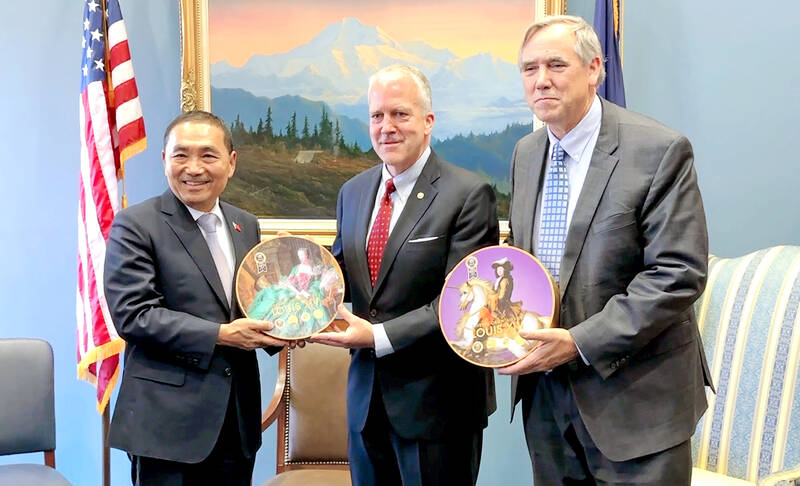New Taipei City Mayor Hou You-yi (侯友宜), the Chinese Nationalist Party’s (KMT) presidential candidate, met 11 lawmakers after speaking at a Washington think tank on Tuesday, which was his final day in the capital on his trip to the US.
Hou met with US senators Roger Wicker, ranking member of the US Senate Armed Services Committee; Dan Sullivan, a member of the committee; Jeff Merkley, a member of the Senate Committee on Foreign Relations; Bill Hagerty, a former US ambassador to Japan; and others, the KMT said.
He also spoke briefly with other senators during his visit to the US Congress, meeting with 11 lawmakers in all during a whirlwind six-and-a-half-hour stop on Capitol Hill, the party said.

Photo: CNA
Following their closed-door meetings, Sullivan told Taiwanese reporters that his fellow senators stressed their bipartisan support for Taiwan and its people during the meeting with Hou.
US lawmakers “don’t get involved in politics in terms of the candidates,” but they do meet with candidates, including when President Tsai Ing-wen (蔡英文) was running for office, Sullivan said.
“So it’s kind of a custom that we have,” he said.
Merkley did not disclose details of his meeting with Hou, saying only that it was a “very good, positive” meeting.
“Our two nations have a lot of collective concerns. Certainly the foremost of those is ensuring that democracy continues to thrive in Taiwan,” he said.
Earlier on Tuesday, Hou visited the Heritage Foundation and shared his opinions about Taiwan in an hour-long meeting that was not open to the media.
Hou’s campaign team said that his eight-day visit to the US was to raise awareness in the US public that Taiwan is an important member of the Indo-Pacific region and is willing to be a “responsible stakeholder,” not a “troublemaker.”
The two sides of the Taiwan Strait should improve dialogue and functional exchanges to effectively lower the risk of potential conflict, Hou’s office said.
Hou is not under any illusions about Beijing’s intentions, but only by steering Taiwan clear of war and maintaining peace in the Taiwan Strait could there be regional stability and prosperity, the office said.
Michael Cunningham, a research fellow in the Heritage Foundation’s Asian Studies Center, told reporters that the participants in its meeting with Hou had a “very substantive discussion” with him.
Although he could not share any details of their discussions, Cunningham said people in the meeting asked Hou “a lot of really tough questions.”
“Mayor Hou answered them all, gave us a great view of, I guess, how he views Taiwan, his vision for Taiwan if he’s elected, and also his understanding of US-Taiwan relations and the challenges Taiwan faces,” he said.
Tuesday was Hou’s last day in Washington before heading to San Francisco to meet with overseas Taiwanese and ethnic Chinese, as well as representatives from tech companies there.
After an overnight stay in San Francisco, Hou is to head back to Taiwan late today.
The trip to the US has been described by Hou’s campaign office as a “journey of dialogue and deepening friendship.”
It is also considered by some to be a test of his ability to handle diplomatic affairs if he were to be elected president in the election in January next year.
It has been a longstanding practice for Taiwanese presidential candidates to visit the US before elections.
Taiwan People’s Party Chairman and presidential candidate Ko Wen-je (柯文哲) and Vice President William Lai (賴清德), the Democratic Progressive Party’s nominee, visited the US earlier this year.
See HOU on page 8

An essay competition jointly organized by a local writing society and a publisher affiliated with the Chinese Communist Party (CCP) might have contravened the Act Governing Relations Between the People of the Taiwan Area and the Mainland Area (臺灣地區與大陸地區人民關係條例), the Mainland Affairs Council (MAC) said on Thursday. “In this case, the partner organization is clearly an agency under the CCP’s Fujian Provincial Committee,” MAC Deputy Minister and spokesperson Liang Wen-chieh (梁文傑) said at a news briefing in Taipei. “It also involves bringing Taiwanese students to China with all-expenses-paid arrangements to attend award ceremonies and camps,” Liang said. Those two “characteristics” are typically sufficient

A magnitude 5.9 earthquake that struck about 33km off the coast of Hualien City was the "main shock" in a series of quakes in the area, with aftershocks expected over the next three days, the Central Weather Administration (CWA) said yesterday. Prior to the magnitude 5.9 quake shaking most of Taiwan at 6:53pm yesterday, six other earthquakes stronger than a magnitude of 4, starting with a magnitude 5.5 quake at 6:09pm, occurred in the area. CWA Seismological Center Director Wu Chien-fu (吳健富) confirmed that the quakes were all part of the same series and that the magnitude 5.5 temblor was

The brilliant blue waters, thick foliage and bucolic atmosphere on this seemingly idyllic archipelago deep in the Pacific Ocean belie the key role it now plays in a titanic geopolitical struggle. Palau is again on the front line as China, and the US and its allies prepare their forces in an intensifying contest for control over the Asia-Pacific region. The democratic nation of just 17,000 people hosts US-controlled airstrips and soon-to-be-completed radar installations that the US military describes as “critical” to monitoring vast swathes of water and airspace. It is also a key piece of the second island chain, a string of

The Central Weather Administration has issued a heat alert for southeastern Taiwan, warning of temperatures as high as 36°C today, while alerting some coastal areas of strong winds later in the day. Kaohsiung’s Neimen District (內門) and Pingtung County’s Neipu Township (內埔) are under an orange heat alert, which warns of temperatures as high as 36°C for three consecutive days, the CWA said, citing southwest winds. The heat would also extend to Tainan’s Nansi (楠西) and Yujing (玉井) districts, as well as Pingtung’s Gaoshu (高樹), Yanpu (鹽埔) and Majia (瑪家) townships, it said, forecasting highs of up to 36°C in those areas